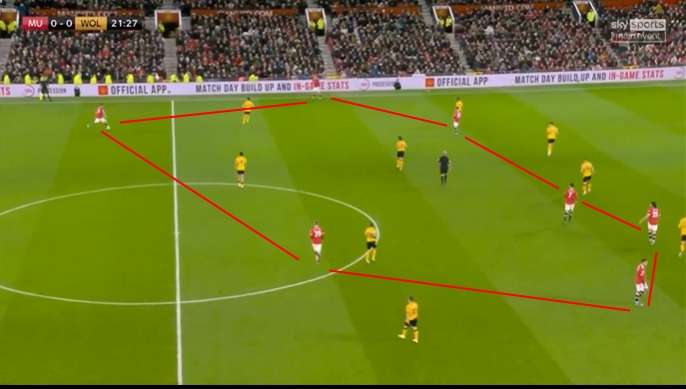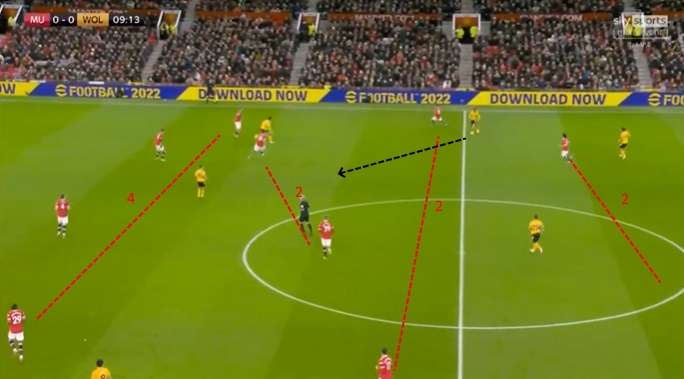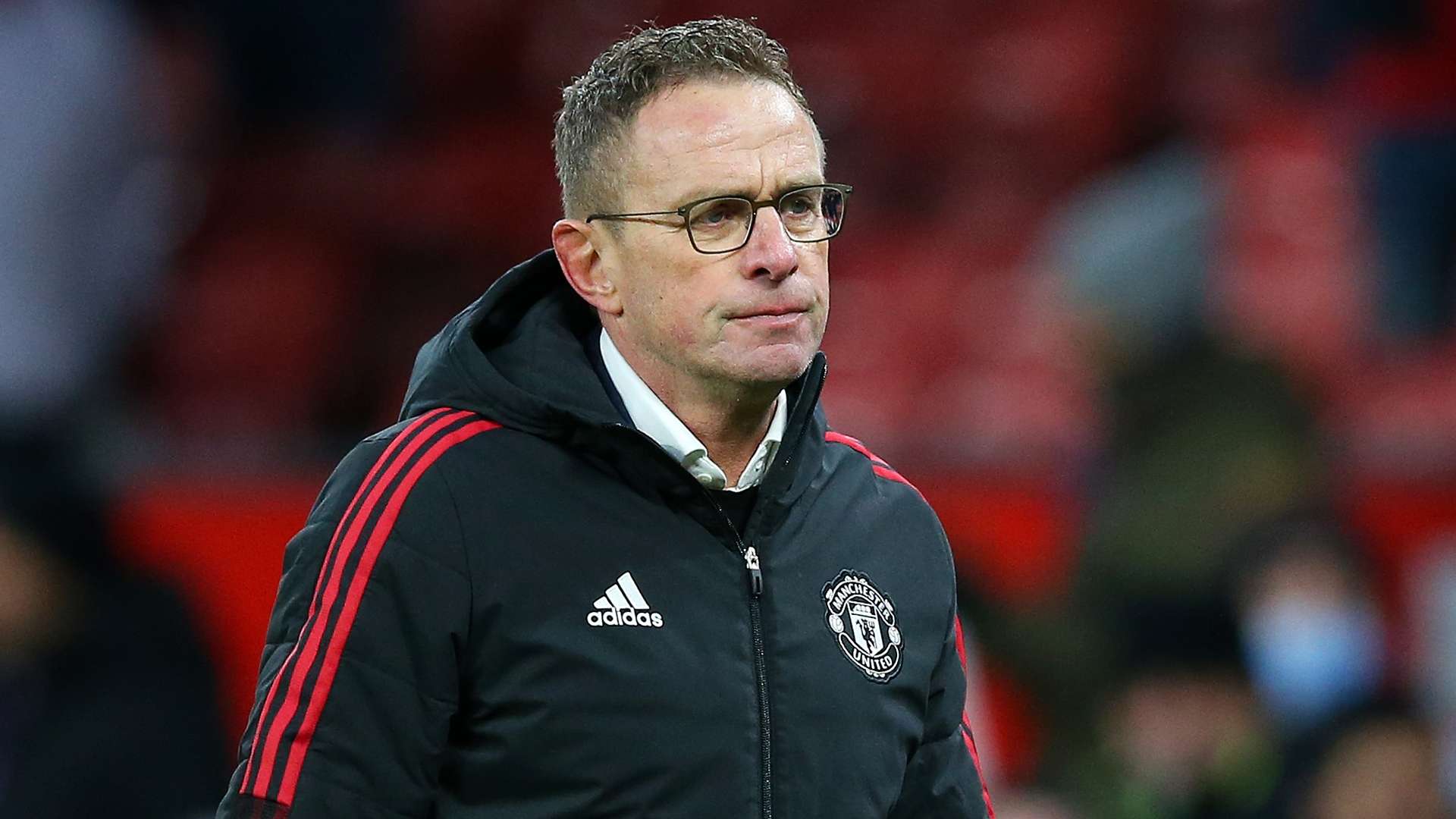Manchester United have been in this position before but Ralf Rangnick has not.
After Monday night's dismal defeat at home to Wolves, left-back Luke Shaw admitted to a lack of unity among the players.
"I didn't think we were all there together," the England international told Sky Sports. "You look at the players we have, we have unbelievable quality but sometimes quality is not enough.
"We need to bring the intensity and more motivation. Inside the dressing room, we know what we want but out on the pitch we need to give 100 per cent.
"To win these types of games we all need to be 100% committed. It is tough and disappointing.
"We have time now to refocus, we have a long training week ahead and maybe the manager can bring some more ideas to what he wants on the pitch."
So, either Rangnick is struggling to get his message across or some players have no interest in receiving it.
Crisis is, of course, the norm at United, but Rangnick will not have expected such difficulties one Covid-hit month into a complete tactical and technical overhaul.
This is his first time managing a super-club and dealing with the pressures that come with it, and if the players are already ignoring his instructions, the board is to blame for the vague nature of his interim-then-consultant role.
Yet this is not all about player power and off-field problems.
Man Utd have been tactically inept so far, scoring one or fewer goals in four of his first five matches in charge, and while being able to take just a handful of training sessions has had a major impact on Rangnick’s ability to introduce his meticulous and complex methods, he is nevertheless making errors that betray his inexperience at this level.
First, it’s worth going over the basics of what Rangnick is trying to achieve.
He is largely responsible for the invention of Germanic hard pressing and transitional football, and like all founders he is somewhat dogmatic: the idea is to press hard in a 4-2-2-2 formation that allows a front four to pierce through the lines quickly once the ball is won, taking advantage of the opponent’s disorganised shape to get in behind.
Man Utd have shown very brief glimpses of this, but on the whole we are seeing nothing; no real pressing whatsoever, and occasional counterattacks in which the front four seem hopelessly disconnected from one another.
This is partly a simple case of Rangnick needing time to get his concepts across, especially after three years of Ole Gunnar Solskjaer, who could scarcely have done less tactical work with these players.
But more importantly, and crucial to our understanding of what Rangnick needs to do over the coming weeks, his 4-2-2-2 formation is simply not designed for the possession and territorial dominance that Man Utd are forced to hold in the Premier League.
When Ralph Hasenhuttl does something similar at Southampton, it works (some of the time) because he sits his team deeper for long periods, allowing short distances between the bodies, and only engaging the hard press on specific triggers.
By contrast, United are forced to be expansive in their shape because the opponent will invariably sit deep and invite the stronger team forward. That means the 4-2-2-2 becomes problematic both on and off the ball.
Taking the Wolves defeat as the most prominent example of an issue that has plagued the first month, United are struggling to create chances because they cannot build coherently through the lines.
Rangnick might prefer to attack quickly, piercing in behind with sharp vertical passes in the transition, but – like Thomas Tuchel, struggling with the same issue recently at Chelsea – holding so much of the ball means you need structured possession that moves carefully through a defensive blockade.
The 4-2-2-2 does not allow for that. Up against a compact and narrow opposition shape, the inside forwards tend to drift out wide to find space on the outside of said shape, leaving Nemanja Matic and Scott McTominay (hardly the best vertical passers to begin with) with no central options.
The result is United playing with a back four and an O-shape, essentially emptying central midfield as those two holding players drop to receive the first pass.
 Sky Sports
Sky SportsAn 'O' shape forms when United use a 4-2-2-2 and are building from the back
That means Man Utd shuffle the ball down the wings in the hope that a diagonal pass will open up into the strikers, which rarely happens.
The best way to think of this is that the 4-2-2-2, being mostly either 4-4-2 or 4-2-4 in reality, creates squares all over the pitch, instead of the triangle links we expect from fluid possession-based formations.
Again, not a problem if you are largely playing on the counter, but it doesn’t make sense when forced to hold most of the ball.
United’s on-the-ball situation is made worse by Bruno Fernandes either being played out of position or dropped entirely, eliminating creativity as four direct dribbling forwards attempt to interact without any playmaker behind them.
The fact United’s forwards are bizarrely coming short for a pass over and over, rather than run in behind, isn’t helping either.
Presumably, they are just confused, attempting to help out Matic and McTominay when the manager would prefer them to make runs for more direct balls forward.
Off the ball, things are just as bad, primarily because the press is non-existent. Without compression between the lines and a coordinated press with a higher line, the squares of 4-2-2-2 allow the opponent to easily counterattack.
On Monday, Wolves’ inside forwards made the simple decision to dribble diagonally, from out to in, in order to slip straight through those massive gaps.
 Sky Sports
Sky SportsIt's easy for Semedo to dip infield and break through the lines of a 4-2-2-2, which creates more squares than it does triangles
And yet even when United were defending deeper in their own half there was a problem.
Wolves’ 3-4-2-1 meant Ruben Neves and Joao Moutinho occupied Matic and McTominay, and with Mason Greenwood and Jadon Sancho tracking the wing-backs (or at least trying to), inside forwards Daniel Podence and Trincao were free to run the game in the half-spaces.
With time, intense training sessions – teaching the United players where to position themselves and how to move and how to press, to avoid being open to counters and to create the transitional attacking moments – could fix most of the issues.
But even so, a formation change, and some adaptation to the pattern of possession dominance, will be needed. What’s more, time is not on Rangnick’s side.
Clearly, the players have too much sway at United, and they appear to feel empowered by Rangnick’s vulnerable status; if performances don’t improve, his consultancy role will likely be reduced to the odd courtesy call.
Things could get worse before they get better.
Back-to-back games against Aston Villa should alarm supporters considering Steven Gerrard’s use of a Christmas tree formation gives United the same inside-forward headache – and considering Matty Cash will make better use of attacking space should he be as free as Nelson Semedo was on Monday night.
There is no certainty things will improve, not without a formation change and perhaps a simplification of the system.
It is encouraging that Rangnick showed flexibility and humility in the second half against Wolves, moving to a 3-4-2-1, bringing Fernandes off the bench into his best position, and instructing Cristiano Ronaldo to start making more runs on the shoulder of the last defender.
It is discouraging that it triggered an improved performance for all of five minutes.
When Rangnick was appointed, he seemed like a good fit.
But perhaps we underestimated how tough he would find managing a super-club for the first time, perhaps we underestimated how difficult it would be to get tactical ideas across mid-season and mid-pandemic, and perhaps we underestimated just how bad a state the club was in when he arrived.
